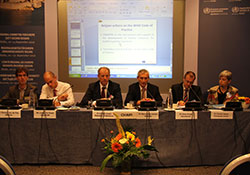Countries discuss challenges in achieving sustainable health workforce

WHO/Brian Cassar
Representatives from health ministries, international organizations and non-governmental organizations gathered this week to discuss actions needed towards achieving a sustainable health workforce and strengthening health systems in the WHO European. The technical discussion took place at the sixty-second session of the WHO Regional Committee for Europe in Malta.
Dr Bjorn-Inge Larsen, Director-General for Health, Chief Medical Officer, Directorate of Health, Norway, and Mr Andrei Usatii, Minister of Health of the Republic Moldova, co-chaired the discussion and shared their experiences as “destination” and “source” country of health workers. The leadership role of Norway and Moldova in promoting the guiding principles of the Code, including transparency and fairness in international recruitment of health personnel, has been widely recognized since the time of developing the Code.
In Norway, the Directorate of Health has established a platform for dialogue among multiple stakeholders, including the private sector and recruitment agencies. The Republic of Moldova has started a 3-year project funded by the European Union (EU) on managing better health professionals’ mobility and migration in the country. With WHO’s technical support, the Republic of Moldova is promoting circular migration of health workers and entering into bilateral agreements with EU Member States.
Mr Usatii said, “We should find out the real needs of our health workforce. We are not going to stop migration, but are making working conditions for health workers more attractive in our own country, and providing options for strengthening health professionals’ education and training to strengthen national health workforce and health systems.”
The EU is taking steps to assist Member States to tackle the key challenges facing the health workforce in the medium to longer term. Mr Sylvian Giraund from the European Commission highlighted 4 core areas of the Action Plan for the EU Health Workforce:
- forecasting health workforce needs and workforce planning by a joint action plan
- anticipating the skills needed in the health sector
- improving recruitment and retention of health professionals
- addressing the ethical recruitment in health, supporting Member States in implementing the WHO Code of Practice.
Mr Lienven De Raedt from Belgium) presented a brief overview of the status, governance structure, and the expected outcomes of the Joint Action on health workforce to be launched in December 2012.
Dr Remco Van De Pas from Wemos, representing the Medicus Mundi International (MMI) Network, spoke about the role and contributions of civil society organizations in relation to the WHO Code of Practice. Wemos, in collaboration with the WHO Regional Office for Europe, will continue working with all stakeholders to improve their awareness of the Code, bringing different stakeholders together and facilitating dialogues and information exchange.
Dr Hans Kluge, Director of Health Systems and Public Health in WHO/Europe, presented a package of WHO documents on human resources for health. The package includes a WHO/Europe roadmap and other tools to support Member States in strengthening country health workforce.
A WHO policy brief reviews the current progress in implementing the Code in the WHO European Region. Dr Kluge emphasised that “the Code goes far beyond the subject of international recruitment of health personnel. The Code is a frame for cooperation and dialogue between countries. It is a guide for Member States to create a sustainable health workforce, to work towards establishing effective planning, education, training, and retention strategies that will reduce the needs to recruit migrant health workers”.



